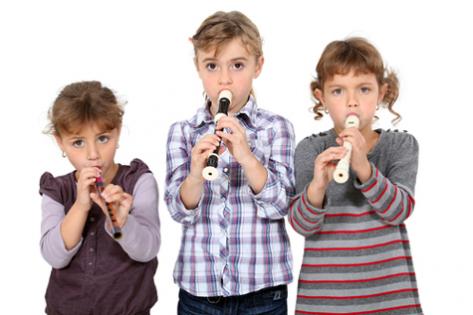With school education continually under the funding microscope, there are some subjects that are always vulnerable to ‘economies’ and reviews of curriculum that see the only priority as the basics of literacy and numeracy.
So where does that leave a cultural pursuit such as music education?
Studies have shown that including musical studies such as learning to play an instrument or class sing-alongs have an impact on the way children learn and process knowledge. Music uses both sides of the brain which makes it valuable in all areas of children’s development.
In case it’s a debate that is happening in your school, here are 10 reasons to advocate for retaining music education at your child's school. If it's affordable and there's time, it's also a great after-school activity for children.
1. Music helps develop children's language skills
When young children listen to familiar words in songs, the neural transmitters in their brains are firing away, and their brains are building connections to the sounds they are hearing and the words they are singing. Singing songs and reciting poems and rhymes with children helps them develop early literacy skills.
Keeping a steady beat develops language. Clapping hands, stamping feet, and using rhythm instruments in time to music develops important pre-reading skills. Young children recognise words, sounds, rhythms, tones, and pitches long before they talk, sing, or dance. So, the more music your children have in their lives, the better they will speak and read.
2. Music helps develop children's self-esteem
Music is a wonderful way to address the many needs of children because music is non-judgmental. There is no right or wrong, it just is what it is. Listening to different types of music nurtures self-esteem and encourages creativity, self-confidence, and curiosity.
3. Music helps develop children's listening skills
Music encourages the ability to listen and thus to concentrate. Songs encourage speech and auditory discrimination. Through music, children learn to hear tempos, dynamics, and melodies. Listening for loud and soft, up and down, fast and slow encourages auditory development in the brain.
4. Music helps develop children's math skills
A simple song can include basic math skills such as counting, repeating patterns, and sequencing.
5. Music helps stimulate children's brain connections
Studies have shown that pre-schoolers who were given early exposure to complex multi-sensory stimulation - in this case, musical keyboard lessons and group singing - scored higher on tests measuring spatial reasoning, a skill used later in math, science, and engineering.
6. Music and movement go together
Children naturally respond to music by moving and being active. Music helps children learn about rhythm and develop motor coordination.
Group dances like the Hokey Pokey help children learn about their body parts ("you put your right foot in," "you put your left hand in…"), sense of direction (turning around, going left and right, moving back and forth), and rhythm patterns (clapping to the beat).
7. Music relieves stress
Stress can be relieved with songs, chants, finger plays, and moving to music. Singing together creates a feeling of safety and makes learning in a classroom much easier.
8. Music encourages creativity in children
A fun game to play with children is changing the words to familiar songs. It is a wonderful way to develop the creative process. Remember in Alice in Wonderland by Lewis Carroll how the words of "Twinkle, Twinkle, Little Star" were changed to "Twinkle, Twinkle Little Bat?"
Choose a song that your child knows well.
9. Music is a great for children with special needs
Music is a fun for all children, including children who have special learning needs. Music experiences can be an effective way to stimulate speech development, provide organisation for cognitive and motor development, and create an environment for socialisation.
10. Music Is for life
Sport is fantastic also and I would like to see all children play an organised sport. But you can’t run around like a 20-year-old when you're 80. However, you can still sing, tap your toes to your favourite tune or play an instrument.








 Agree (0)
Agree (0) Disagree (
Disagree (











__small.png)










